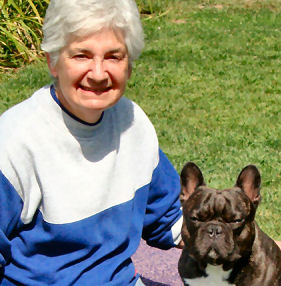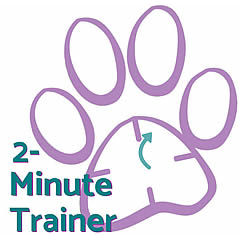How many times have you, or a dog-owning friend, joked about your dog having trained you well? Laugh all you want, but there’s a truth buried in there. Our dogs are good at training us. We just have to be better at recognizing it. If it’s something that’s cute, or good, or endearing, it’s fine to leave it alone. But if it’s something that really doesn’t work for you, it’s time to turn it around. Ask yourself, “Is your dog training you?”
It happens to all of us, especially those of us with dogs trained with positive reinforcement. Our dogs know how to push the treat button. They do something cute and they expect to be rewarded for it. And it’s difficult to resist those puppy-dog eyes.

For instance, Hope’s French Bulldog Torque thinks he ought to get rewarded whenever he sits in front of her. Even in our own yard, he’ll be watching the birds, or squirrels, and then dash over and sit right in front of her. And it worked every time. Until he started getting pushy and barked at her when she was too slow with the treats.
Like anyone, she absent-mindedly started reaching for the treat pouch, thinking “Oh, yeah. He’s sitting like a good boy.” Then she realized what was happening. Hope almost rewarded her dog for barking at her. We all know that what gets rewarded gets repeated. She could imagine a lifetime of being barked at by her very cute, but very rude dog.
Pay attention
If Hope hadn’t caught herself, she would have had the uphill battle of un-training a behavior. It’s actually easier to set and maintain performance criteria than it is to change things later.
A good example is a smart young Labrador Retriever in our Rally class. She has been rewarded often and well for lying down. Her “Down!” is excellent. It’s also her default behavior when she doesn’t understand what her person is asking. When she’s not sure what she’s supposed to do, she lies down. Which always gets her a smile and a treat from her person. That’s fine, if they’d asked for a “Down!” It’s not okay when she was asked to “Stand!” or “Stay!” or “Sit!” By rewarding a behavior they didn’t want, their dog has trained them to do what she wants.
Still the hardest part of training
The most popular tip we ever wrote was called “The hardest part of dog training.” It’s still true. The most difficult part of dog training is waiting. Waiting for your dog to do what you asked. Taking the time for them to learn to make good choices. Being patient while they think through the situation.
In our Novice Obedience competition class one of the absolutes for dogs is they must sit automatically when you come to a halt in heeling. Every single time. There are no exceptions, so an automatic sit is one of the first things we work on. In class this week the atmosphere was charged. There were major storms in the area and everybody’s phone kept blaring with weather alerts. The dogs (and the people) were all a bit unsettled.
We were doing run-throughs to simulate an actual obedience trial. One of the dogs, normally a rock-steady performer, lost her automatic sits during heeling. Her person was all ready to tell her to sit. But that’s not allowed in competition, so Hope told her to just wait. Look at the dog’s rear end and just wait. For a good 15-20 seconds (seems like a lifetime), the dog just looked at her. And then the dog remembered and sat.
Don’t let them train you
It holds true in this situation, too. If you repeat a command, help your dog, or accept less than what you wanted, ask yourself, “Is your dog training you?” Dogs are really smart and most are excellent at finding the easy way to do things. It’s easier for them to have you do the work. Ask them to step up and be your partner.







Great reminder to not let them train you. Thank you!